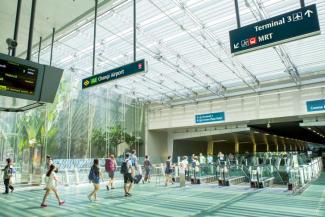
Singapore, 27 September 2017 (Wednesday) – The Institute of Service Excellence at Singapore Management University (ISE@SMU) today released the 2017 second quarter (Q2) Customer Satisfaction Index of Singapore (CSISG) results for the Air Transport and Land Transport sectors.
Land Transport
· Local respondents found to be more satisfied with public buses and taxi services, and less satisfied with trains
· Local train respondents reported lower perceived quality and lower perceived value scores compared to the year before
The Land Transport sector scored 67.8 points, an increase of 0.99-point over the same period last year. The sector is made up of Taxi Services, Transport Booking Apps, Public Buses, and Mass Rapid Transit System.
Out of the four sub-sectors mentioned, only Taxi Services and Public Buses registered year-on-year increases in customer satisfaction levels. Taxi Services scored 71.8 points (+1.85-points year-on-year) and Public Buses scored 64.9 points (+2.23 points year-on-year). Despite the rise in customer satisfaction score for Taxi Services, ratings for ‘comfort of the ride’ saw a year-on-year decline. In addition, local respondents rated private-hire cars more highly on ‘comfort of the ride’ compared to taxis.
“With increased competition among taxis and private-hire cars, understanding what matters to commuters is key to helping operators focus their efforts on the areas that will make a difference to how satisfied they make their customers,” said Ms Neeta Lachmandas, Executive Director of ISE.
For Public Buses, improvements in travel time and availability of information were observed. Specifically, attributes such as ‘Travel time to reach destination’ and ‘Availability of bus route information’ saw marked upticks in satisfaction ratings.
Transport Booking Apps scored 69.3 points (+0.52-points year-on-year), maintaining its performance from the year before, as the change in scores was not statistically significant. For Transport Booking Apps users, customer satisfaction was found to be higher among those who took private-hire cars compared to those who used taxis.
Mass Rapid Transit System saw a drop in customer satisfaction levels from the year before. The sub-sector scored 64.8 points, a decline of 1.60-points from its 2016 Q2 performance. In particular, customer satisfaction and perceived quality scores for the sub-sector were found to be significantly lower in July 2017 compared to preceding months between April 2017 and June 2017. The decline was correlated with the commencement of weekday signaling tests at the end of May 2017 and various train disruptions in the adjacent months.
“We found that ‘train frequency’, ‘handling of train disruptions’ and ‘reliability of trains’ were top attributes with significant impact on perceived quality. It is clear that commuters’ perceptions of quality relate to whether train operations are well managed to get them to their destination in an effective manner,” said Mr Chen Yongchang, Head of Research and Consulting at ISE.
While ‘Reliability of trains’ saw a year-on-year decline in satisfaction rating, particularly for locals, other attributes such as ‘Sufficiency of train arrival information’, ‘Helpfulness of staff’ and ‘Ease of moving within station’ registered improvements in satisfaction ratings among respondents.
Air Transport
· Locals more satisfied with budget airlines compared to last year
· Customer satisfaction scores for full service airlines were unchanged
The Air Transport sector scored 74.4 points, a decrease of 1.10-points from the year before. The sector is made up of Airport, Full Service Airlines, and Budget Airlines. The Airport sub-sector saw a decrease in customer satisfaction levels with a score of 77.1 points, a decline of 4.23-points year-on-year. Full Service Airlines maintained its customer satisfaction performance at 74.2 points (+0.66-points year-on-year), the marginal increase is not considered statistically significant. Budget Airlines scored 71.2 points, an increase of 1.69-points year-on-year, led mostly by more satisfied local customers.
Across Full Service Airlines and Budget Airlines, ‘Comfort of the journey’ emerged as the top attribute that drove perceptions of quality among local respondents. With tourists, customer service based attributes relating to ground staff and cabin crew were the key differentiators of quality.
The CSISG 2017 Q2 study was conducted between April and July 2017. A total of 6,750 respondents comprising 4,300 locals and 2,450 tourists were surveyed.
Please refer to Annex A for a background on the CSISG and Annex B for the detailed scores.
For media queries, please contact:
Ms Serene Ashley Chen
Assistant Director, Partnerships and Programme Development
Institute of Service Excellence (ISE) at Singapore Management University
DID: (65) 6808 5103
Mobile: (65) 9151 9030
Email: serenechen [at] smu.edu.sg (serenechen[at]smu[dot]edu[dot]sg)
Mr Teo Chang Ching
Senior Assistant Director, Corporate Communications
Office of Corporate Communications and Marketing
DID: (65) 6828 0451
Mobile: (65) 9431 8353
Email: ccteo [at] smu.edu.sg